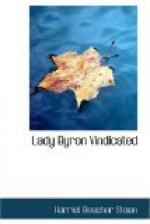The morality of the times is strikingly exemplified even in its literary criticism.
For example: One of Byron’s poems, written while a schoolboy at Harrow, is addressed to ‘My Son.’ Mr. Moore, and the annotator of the standard edition of Byron’s poems, gravely give the public their speculations on the point, whether Lord Byron first became a father while a schoolboy at Harrow; and go into particulars in relation to a certain infant, the claim to which lay between Lord Byron and another schoolfellow. It is not the nature of the event itself, so much as the cool, unembarrassed manner in which it is discussed, that gives the impression of the state of public morals. There is no intimation of anything unusual, or discreditable to the school, in the event, and no apparent suspicion that it will be regarded as a serious imputation on Lord Byron’s character.
Modern physiological developments would lead any person versed in the study of the reciprocal influence of physical and moral laws to anticipate the most serious danger to such an organisation as Lord Byron’s, from a precocious development of the passions. Alcoholic and narcotic stimulants, in the case of such a person, would be regarded as little less than suicidal, and an early course of combined drinking and licentiousness as tending directly to establish those unsound conditions which lead towards moral insanity. Yet not only Lord Byron’s testimony, but every probability from the licence of society, goes to show that this was exactly what did take place.
Neither restrained by education, nor warned by any correct physiological knowledge, nor held in check by any public sentiment, he drifted directly upon the fatal rock.
Here we give Mr. Moore full credit for all his abatements in regard to Lord Byron’s excesses in his early days. Moore makes the point very strongly that he was not, de facto, even so bad as many of his associates; and we agree with him. Byron’s physical organisation was originally as fine and sensitive as that of the most delicate woman. He possessed the faculty of moral ideality in a high degree; and he had not, in the earlier part of his life, an attraction towards mere brutal vice. His physical sensitiveness was so remarkable that he says of himself, ’A dose of salts has the effect of a temporary inebriation, like light champagne, upon me.’ Yet this exceptionally delicately-organised boy and youth was in a circle where not to conform to the coarse drinking-customs of his day was to incur censure and ridicule. That he early acquired the power of bearing large quantities of liquor is manifested by the record in his Journal, that, on the day when he read the severe ‘Edinburgh’ article upon his schoolboy poems, he drank three bottles of claret at a sitting.
Yet Byron was so far superior to his times, that some vague impulses to physiological prudence seem to have suggested themselves to him, and been acted upon with great vigour. He never could have lived so long as he did, under the exhaustive process of every kind of excess, if he had not re-enforced his physical nature by an assiduous care of his muscular system. He took boxing-lessons, and distinguished himself in all athletic exercises.




